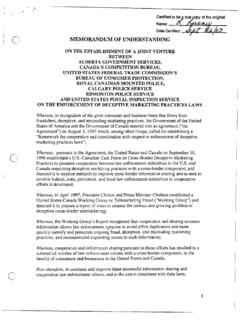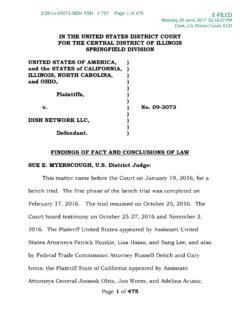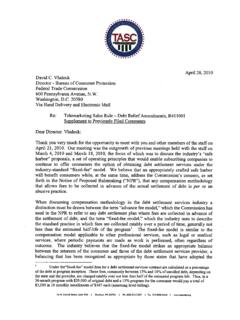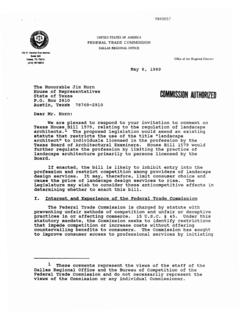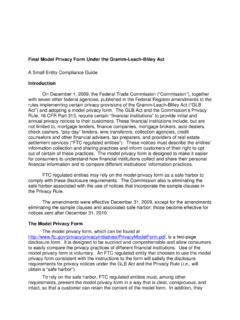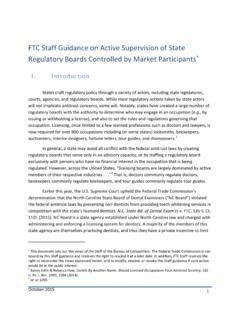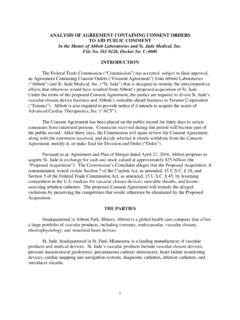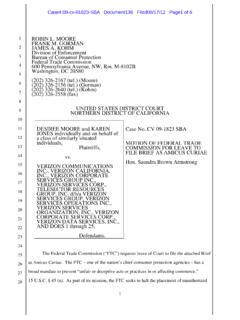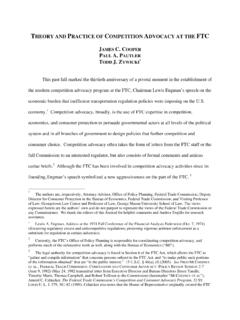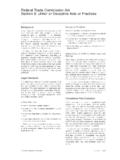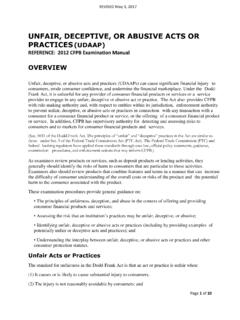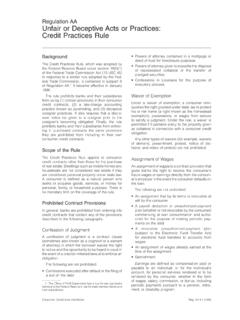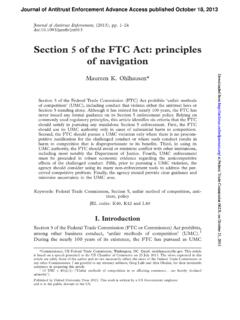Transcription of FTC Policy Statement on Deception - Federal Trade …
1 FTC Policy Statement on Deception DATE: October 14, 1983 Appended to Cliffdale Associates, Inc., 103 110, 174 (1984). The Honorable John D. Dingell Chairman Committee on Energy and Commerce House of Representatives Washington, 20515 Dear Mr. Chairman: This letter responds to the Committee's inquiry regarding the Commission's enforcement Policy against deceptive acts or We also hope this letter will provide guidance to the public. Section 5 of the FTC Act declares unfair or deceptive acts or practices unlawful. Section 12 specifically prohibits false ads likely to induce the purchase of food, drugs, devices or cosmetics. Section 15 defines a false ad for purposes of Section 12 as one which is "misleading in a material respect.
2 "2 Numerous Commission and judicial decisions have defined and elaborated on the phrase " deceptive acts or practices " under both Sections 5 and 12. Nowhere, however, is there a single definitive Statement of the Commission's view of its authority. The Commission believes that such a Statement would be useful to the public, as well as the Committee in its continuing review of our jurisdiction. We have therefore reviewed the decided cases to synthesize the most important principles of general applicability. We have attempted to provide a concrete indication of the manner in which the Commission will enforce its Deception mandate. In so doing, we intend to address the concerns that have been raised about the meaning of Deception , and thereby attempt to provide a greater sense of certainty as to how the concept will be I.
3 SUMMARY Certain elements undergird all Deception cases. First, there must be a representation, omission or practice that is likely to mislead the practices that have been found misleading or deceptive in specific cases include false oral or written representations, misleading price claims, sales of hazardous or systematically defective products or services without adequate disclosures, failure to disclose information regarding pyramid sales, use of bait and switch techniques, failure to perform promised services, and failure to meet warranty Second, we examine the practice from the perspective of a consumer acting reasonably in the circumstances. If the representation or practice affects or is directed primarily to a particular group, the Commission examines reasonableness from the perspective of that group.
4 Third, the representation, omission, or practice must be a "material" one. The basic question is whether the act or practice is likely to affect the consumer's conduct or decision with regard to a product or service. If so, the practice is material, and consumer injury is likely, because consumers are likely to have chosen differently but for the Deception . In many instances, materiality, and hence injury, can be presumed from the nature of the practice. In other instances, evidence of materiality may be necessary. Thus, the Commission will find Deception if there is a representation, omission or practice that is likely to mislead the consumer acting reasonably in the circumstances, to the consumer's detriment.
5 We discuss each of these elements below. II. THERE MUST BE A REPRESENTATION, OMISSION, OR PRACTICE THAT IS LIKELY TO MISLEAD THE CONSUMER. Most Deception involves written or oral misrepresentations, or omissions of material information. Deception may also occur in other forms of conduct associated with a sales transaction. The entire advertisement, transaction or course of dealing will be considered. The issue is whether the act or practice is likely to mislead, rather than whether it causes actual Of course, the Commission must find that a representation, omission, or practice occurred. In cases of express claims, the representation itself establishes the meaning. In cases of implied claims, the Commission will often be able to determine meaning through an examination of the representation itself, including an evaluation of such factors as the entire document, the juxtaposition of various phrases in the document, the nature of the claim, and the nature of the In other situations, the Commission will require extrinsic evidence that reasonable consumers reach the implied In all instances, the Commission will carefully consider any extrinsic evidence that is introduced.
6 Some cases involve omission of material information, the disclosure of which is necessary to prevent the claim, practice, or sale from being Information may be omitted from written10 or oral11 representations or from the commercial In some circumstances, the Commission can presume that consumers are likely to reach false beliefs about the product or service because of an omission. At other times, however, the Commission may require evidence on consumers' Marketing and point-of-sales practices that are likely to mislead consumers are also deceptive . For instance, in bait and switch cases, a violation occurs when the offer to sell the product is not a bona fide The Commission has also found Deception where a sales representative misrepresented the purpose of the initial contact with When a product is sold, there is an implied representation that the product is fit for the purposes for which it is sold.
7 When it is not, Deception There may be a concern about the way a product or service is marketed, such as where inaccurate or incomplete information is A failure to perform services promised under a warranty or by contract can also be III. THE ACT OR PRACTICE MUST BE CONSIDERED FROM THE PERSPECTIVE OF THE REASONABLE CONSUMER The Commission believes that to be deceptive the representation, omission or practice must be likely to mislead reasonable consumers under the The test is whether the consumer's interpretation or reaction is When representations or sales practices are targeted to a specific audience, the Commission determines the effect of the practice on a reasonable member of that group.
8 In evaluating a particular practice, the Commission considers the totality of the practice in determining how reasonable consumers are likely to respond. A company is not liable for every interpretation or action by a consumer. In an advertising context, this principle has been well-stated: An advertiser cannot be charged with liability with respect to every conceivable misconception, however outlandish, to which his representations might be subject among the foolish or feeble-minded. Some people, because of ignorance or incomprehension, may be misled by even a scrupulously honest claim. Perhaps a few misguided souls believe, for example, that all "Danish pastry" is made in Denmark. Is it therefore an actionable Deception to advertise "Danish pastry" when it is made in this Of course not, A representation does not become "false and deceptive " merely because it will be unreasonably misunderstood by an insignificant and unrepresentative segment of the class of persons to whom the representation is addressed.
9 Heinz W. Kirchner, 63 1282, 1290 (1963). To be considered reasonable, the interpretation or reaction does not have to be the only When a seller's representation conveys more than one meaning to reasonable consumers, one of which is false, the seller is liable for the misleading An interpretation will be presumed reasonable if it is the one the respondent intended to convey. The Commission has used this standard in its past decisions..The test applied by the Commission is whether the interpretation is reasonable in light of the claim."23 In the Listerine case, the Commission evaluated the claim from the perspective of the "average listener."24 In a case involving the sale of encyclopedias, the Commission observed "[i]n determining the meaning of an advertisement, a piece of promotional material or a sales presentation, the important criterion is the net impression that it is likely to make on the general populace.
10 "25 The decisions in American Home Products, Bristol Myers, and Sterling Drug are replete with references to reasonable consumer In a land sales case, the Commission evaluated the oral statements and written representations "in light of the sophistication and understanding of the persons to whom they were directed."27 Omission cases are no different: the Commission examines the failure to disclose in light of expectations and understandings of the typical buyer28 regarding the claims made. When representations or sales practices are targeted to a specific audience, such as children, the elderly, or the terminally ill, the Commission determines the effect of the practice on a reasonable member of that For instance, if a company markets a cure to the terminally ill, the practice will be evaluated from the perspective of how it affects the ordinary member of that group.
